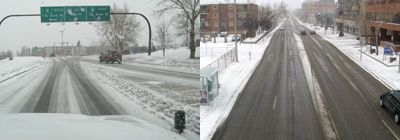Road salt management plan
The City believes in using the right amount of material (including salt or sanding product) at the right place and the right time.
- When road surface temperatures are between 0 and -10 degrees Celsius, and the temperature is not expected to go any lower, salt is used to melt accumulated snow and ice.
- When road surfaces are below -10 degrees Celsius, with colder temperatures forecasted, a sanding chip mixture (3% salt, 97% fine gravel) called Pickle is used.
All sanding trucks are equipped with automatic controls that allow operators to spread a fixed amount of material depending on road conditions.
Anti-Icing
When snow is predicted, a calcium chloride anti-icing solution is applied to designated roadways around the city. This environmentally-friendly compound helps prevent ice and snow from accumulating on selected roads during a snowfall.

Before and after photo of anti-iced roadway
Frequently asked questions
What are road salts?
Road salts include sodium chloride (NaCl), calcium chloride (CaCl2), potassium chloride (KCl) and magnesium chloride (MgCl2). The City of Calgary only uses sodium chloride and calcium chloride. Roads salts used for snow and ice control may be solid or liquid brines.
Are road salts harmful?
Health Canada released a report in 2001 that indicates road salts are not harmful to humans. However, a 2001 assessment report by Environment Canada indicates that road salts can enter the environment in amounts large enough to pose a risk to plants, animals, birds, fish, lake and stream ecosystems and groundwater.
As a result of this scientific assessment, Environment Canada made recommendations to add road salts to Schedule 1 (Priority Substances List) of the Canadian Environment Protection Act (CEPA). This recommendation led Environment Canada to release the Code of Practice for the Environmental Management of Road Salts in 2004. For more information on Environment Canada's Code of Practice, visit Environment Canada and type "road salts" in the search box.
How does The City manage the environmental impact of road salts?
The City of Calgary’s snow response is guided, in part, by a Road Salt Management Plan in accordance with Environment Canada's Code of Practice. The goal of the plan is to improve environmental protection without compromising road safety for our citizens.
How does The City's Salt Management Plan help the environment?
The City's Salt Management Plan outlines best practices for salt use and storage. For example:
- Controls – Electronic controls are used on The City’s sanding and salting equipment. These controls are set to deliver precise amounts of sanding and salting product and are calibrated regularly.
- Storage – The City has salt storage facilities at Mobility City depots across Calgary. Salt is stored indoors to:
- Prevent wind erosion of road salt products.
- Prevent stockpile run-off by keeping precipitation off stored products.
How much road salt does The City of Calgary use?
The City applies approximately 30,000 to 40,000 tonnes of road salts annually to ensure our roads are in good winter driving condition. Any remaining material on the road after winter months is collected as part of The City’s Spring Clean-up program.

